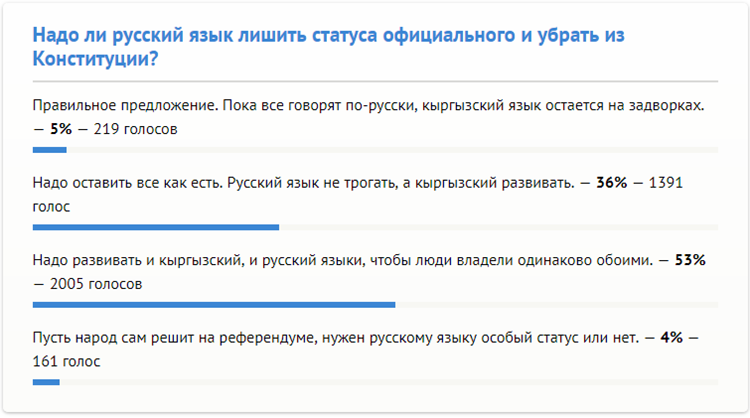Статус русского языка в Кыргызстане
Упражнение 4. Русский язык в Кыргызстане.
As you learned, Russian has the status of “official” language in Kyrgyzstan, but its status is sometimes debated and discussed. In 2019, the news website 24.kg polled its readers about whether the status of Russian should change. Read the poll results and then drag the English summaries of the poll results to the number of people who thought that way. Note that some of the statements not appear in the poll results.
If you need help reading the poll results, you can also read them in the accordion labeled “Текст опроса” below.

Давайте почитаем! Закон о переходе на государственный язык.
In 2023, a new law went into effect that established that the Kyrgyz language should be used exclusively in some spheres. Below you will read a partial listing of these areas. Then decide which areas are on that list.
«О государственном языке Кыргызской Республики»
Кыргызский язык должен использоваться:
👉 при подготовке и проведении выборов и референдумов
👉 при заключении международных договоров
👉 в географических наименованиях
👉 в сферах образования, науки, культуры, телевидения и радиовещания, средствах массовой информации, книгоиздании, пользовательских интерфейсах компьютерных программ и веб-сайтов, публичных мероприятий, рекламе, транспорте
👉 при оформлении паспортов, документов об образовании
Давайте послушаем! Мнения: нужен ли русский язык в Кыргызстане?
In the following two videos, people give their opinions about what would happen if the Russian language was forbidden in Kyrgyzstan or whether they think Kyrgyz citizens need the Russian language. The majority of people say that Kyrgyz people need the Russian language. Can you guess what some of the reasons that they give for this are?
See if you came up with some that are on the list here. Then watch the videos and decide how many people expressed each of these opinions.
Давайте поговорим! Сколько людей считает…?
Use what you learned in the previous activity and ask your partners questions about how many people have particular opinions. Use the Подсказка if you need help with the grammar of the constructions.
Образец:
– Ско́лько люде́й счита́ет, что ру́сское влия́ние в Кыргызста́не сильне́е, чем в Евро́пе?
– Оди́н челове́к счита́ет, что ру́сское влия́ние в Кыргызста́не сильне́е, чем в Евро́пе.
Follow-up activities:
After the war started in Ukraine, the attitude of people in some countries towards the Russian language has begun to change.
а. You can learn about this trend in Ukraine in these two articles:
in Russian: С начала войны украинцы меньше используют русский язык
in English: ‘It Will Perish When I’m Gone’: Russian Language Usage Plunges In Wartime Ukraine
б. Revisit (or visit for the first time) some other pages from Diverse Russian that discuss this topic:
Языки в Украине
Русский язык в странах Балтии
в. Choose another country and see if you can find any information on the internet in Russian or in another language about whether this has happened in that country and then present that to your classmates in English or in Russian, according to your teacher’s instructions.
Sources:

